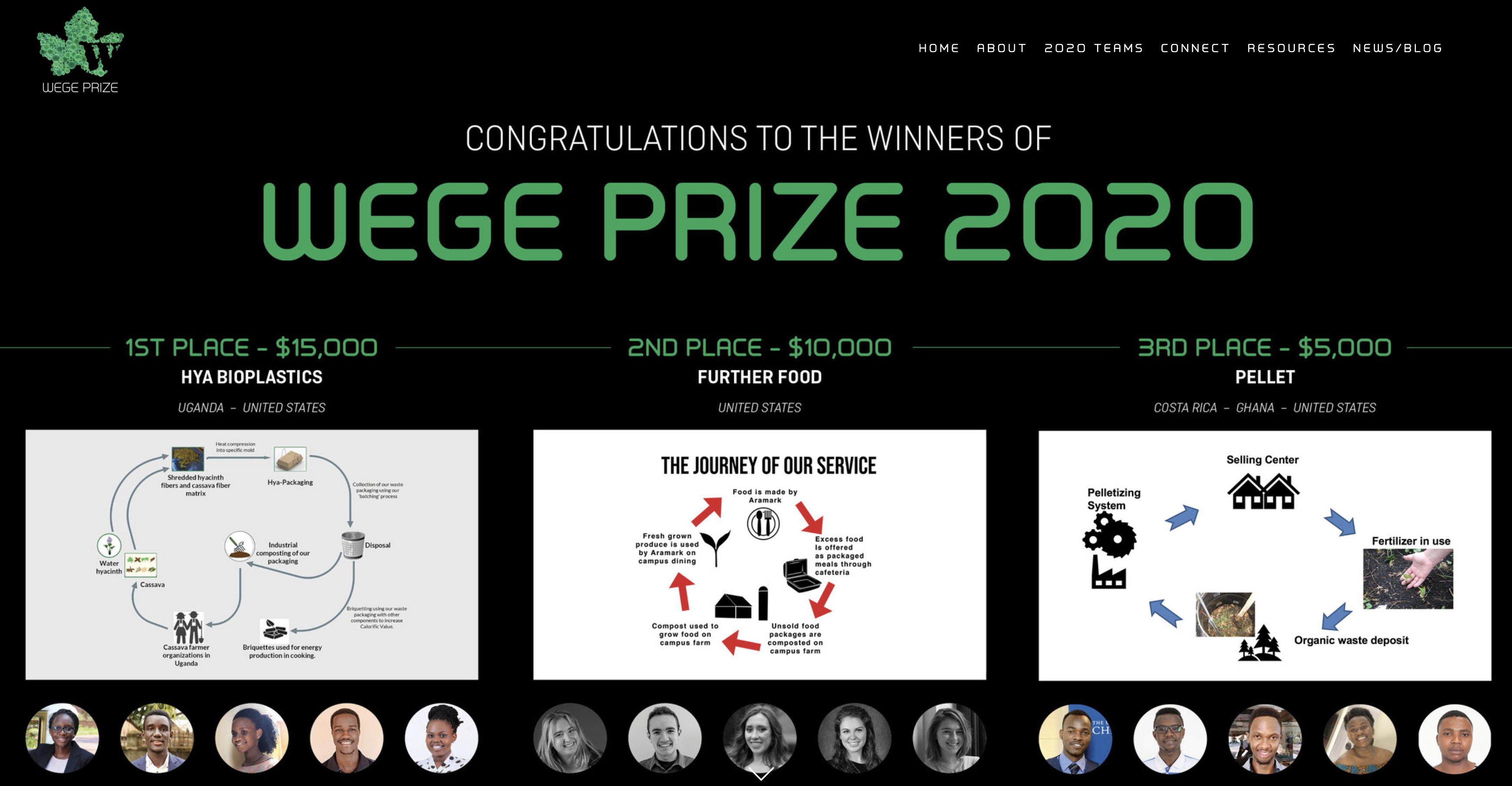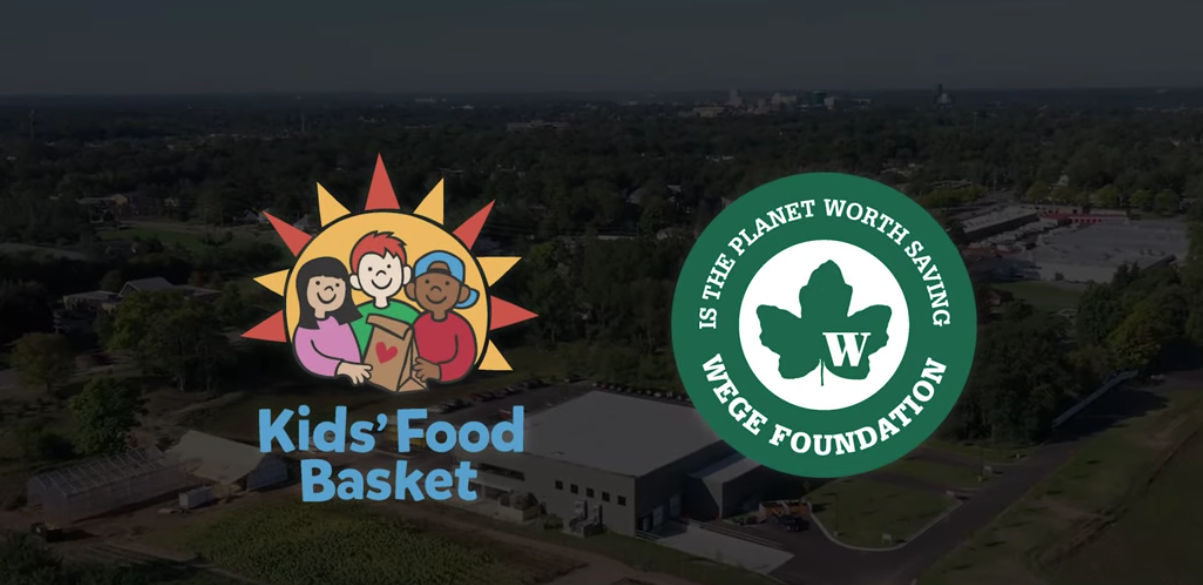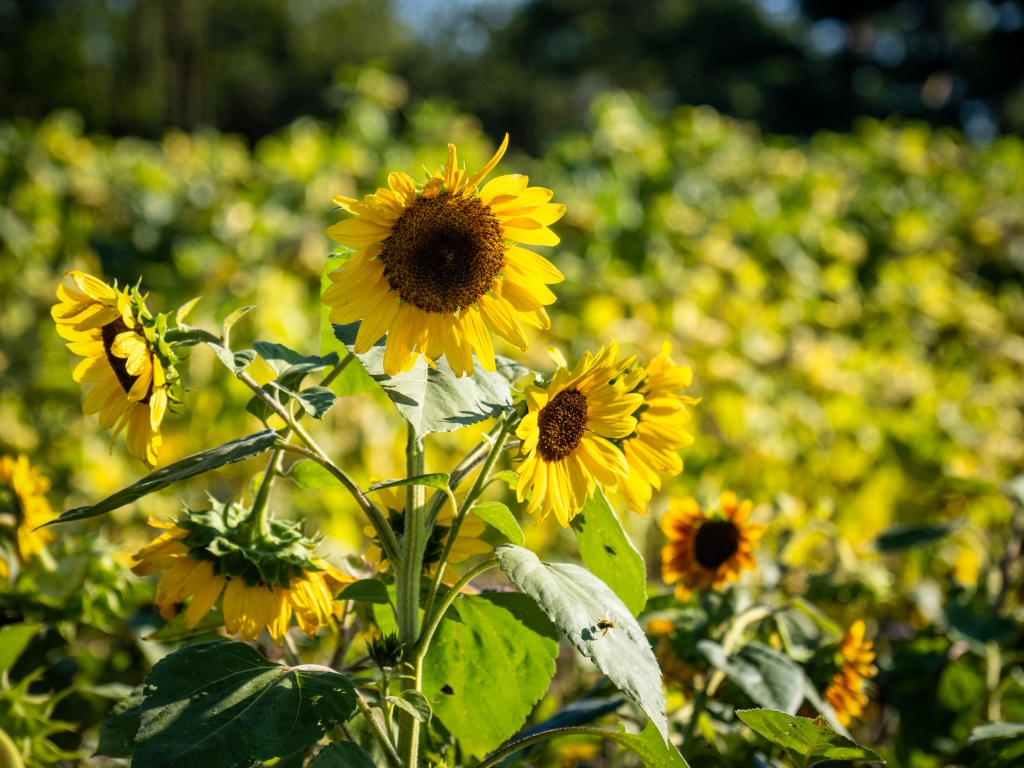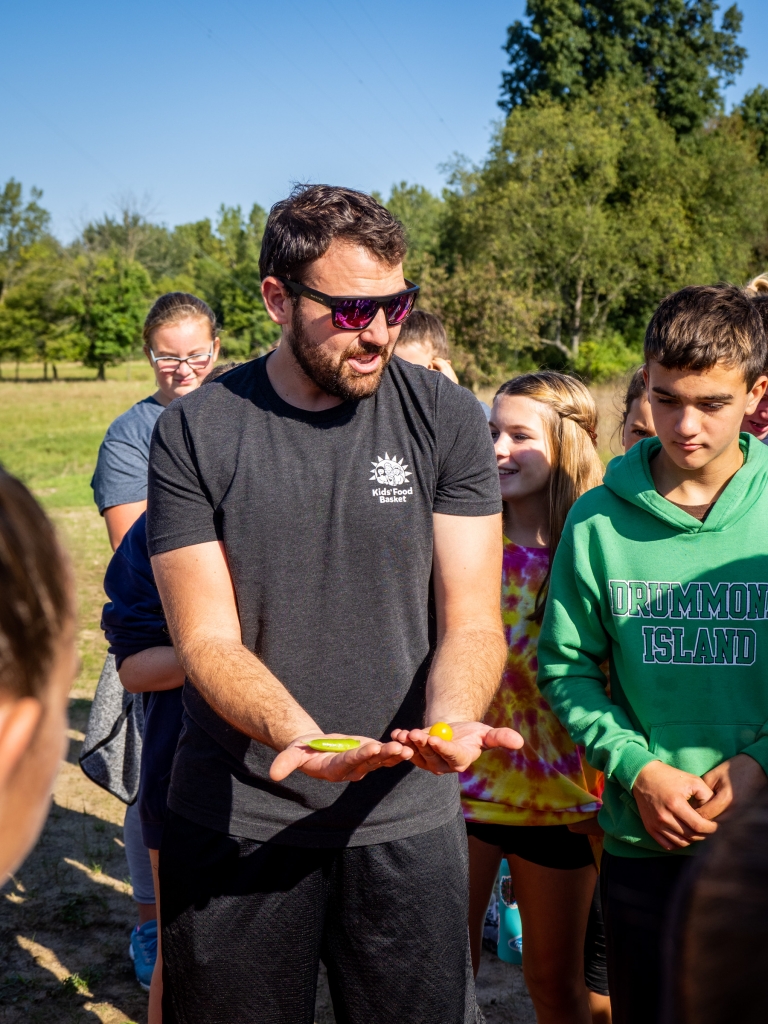Global Student Design Competition Ignites Game-Changing Sustainable Solutions for the Economy of the Future, Provides Powerful and Accessible Platform for Systemic Change
Kendall College of Art and Design of Ferris State University (KCAD)
Announces Winners of Wege Prize 2020 Design Competition; 2021 competition launched
Team of students studying in Uganda and the United States wins top prize of $15,000 USD with a proposal to transform one of the world’s most invasive plants into a biodegradable raw material that could help make single-use plastic products obsolete.
Grand Rapids, Mich. June 3, 2020 – Covid. Climate. Injustice. Waste. Disparity. Hunger. Poverty. So much is at critical mass in our world that we have no choice but to address multiple interconnected global issues simultaneously. And if we’re to solve these complex, layered problems, we need individuals capable of working across the barriers that divide us to drive systems-level change.
That’s why Wege Prize—an annual international design competition organized by Kendall College of Art and Design of Ferris State University (KCAD)—provides a powerful and accessible platform for any college or university student in the world to develop tangible solutions to “wicked” problems through a collaborative process that transcends disciplinary, cultural, and institutional boundaries.
Wege Prize teams are inspired to reframe the way we produce and consume by developing products, services, business models, or other solutions that address systematic issues while also helping power a transition from our current linear economy—in which we take, make, and dispose—to a circular economy that’s regenerative by design.
At the recent 2020 Wege Prize Awards, the five finalists that emerged from an initial field of 29 teams— representing 24 countries, 64 academic institutions, and 100 unique academic disciplines—presented bold ideas that evolved over nine months of intensive research, testing, networking, prototyping, and direct feedback from the competition’s panel of expert judges.
The winners of Wege Prize 2020 are:
1st Place ($15,000) – Hya Bioplastics – Click here to learn more about the Hya Bioplastics team.
Institutions represented: Georgia Institute of Technology (United States), Makerere University (Uganda)
Disciplines represented: Commerce, Chemical and Biomolecular Engineering, Civil Engineering, Industrial Chemistry, Mechanical Engineering
Solution: What if one of the world’s most invasive plants could help spell the end for single-use plastic?
Hya Bioplastics is developing a process that blends dried water hyacinth fibers and boiled cassava starch into a biodegradable raw material for the production of disposable plates, cups, silverware, and packaging. At the same time, the process helps mitigate the threats posed by the spread of water hyacinth.
With approximately 86% of the more than 400 million tons of plastic produced in the world each year entering the waste stream, the need for alternatives has never been more dire. Similarly, water hyacinth is invading already-scarce freshwater sources around the world at an alarming rate, growing up to 17.5 tons per hectare per day and harboring disease-spreading organisms, compromising drinking water supplies, and negatively affecting other marine life in the process.
The true elegance of Hya Bioplastics’ idea lies in its use of one problem to solve another, and in the team’s keen understanding of the systems they’re disrupting. The team has already developed prototype sheets of its proposed material, begun testing product designs with it, and vetted its compostability through a number of different methods.
“We’ve seen a lot of examples of bioplastics out there, but the use here of local invasive species as feedstock is particularly insightful,” said judge Alysia Garmulewicz, an associate professor at Universidad de Santiago de Chile and fellow at the University of Oxford who researches digital fabrication and the circular economy. “This solution is also incredibly replicable and scalable, with a promising potential for real-world implementation.”
2nd Place ($10,000) – Further Food – Click here to learn more about the Further Food team.
Institutions represented: Kendall College of Art and Design of Ferris State University (United States), Grand Valley State University (United States), Oakland University (United States)
Disciplines represented: Collaborative Design, English Literature, Environmental and Sustainability Studies, Graphic Design, Nursing
What if we could streamline and reduce pre-consumer food waste at a university level by offering to-go meal packages and on-campus composting?
Further Food is developing a regenerative system that transforms unused food from campus dining services into packaged meals made available to students during the final hours of cafeteria operations, while leftover waste is diverted to an on-campus composting facility. The system keeps nutrients cycling through campus while also creating economic value, social capital, and educational/research opportunities.
In the United States alone, university students each produce an estimated 142 pounds of food waste each year, while the equally-wicked problems of hunger and food access persist. By interfacing with campus dining services at their respective institutions and engaging in extensive customer validation studies, Further Food was able to envision a viable, profitable, and scalable service that designs out waste, increases food access for students in need, and generates additional revenue, material capital, and educational opportunities for universities.
In addition, Further Food’s solution has the potential to help reverse the stigma around leftover food in ways that could have a profound impact not just on campus dining services, but across our society.
“We’ve heard ideas about campus food waste before, but what really impressed the judges is how this team’s vision extends beyond a single campus and into a model that could be replicated on any campus,” said judge Colin Webster, a learning content manager with the UK-based Ellen MacArthur Foundation, a global leader in circular economy research, advocacy, and development. “But the biggest implication for me is the potential for this to go beyond a campus and into all sorts of different environments. If you get this right, the model could really take off and become a new normal for how to deal with food waste.”
3nd Place ($5,000) – Pellet – Click here to learn more about the Pellet team.
Institutions represented: Ashesi University (Ghana), EARTH University (Costa Rica), Trinity College (United States)
Disciplines represented: Agricultural Sciences, Biomedical Engineering, Business Administration, Mechanical Engineering
What if organic waste from urban restaurants and residences could give rural farmers access to affordable and environmentally friendly fertilizer?
Pellet is developing a system to do just that by tackling persistent waste streams while creating economic opportunity, nurturing soil health, and aiming to jumpstart a budding industry in Rwanda in the process.
With 80% of Rwandans involved in agriculture, and the industry comprising 30% of the country’s GDP, the demand for fertilizer is incredibly high, around 49,000 megatons in 2019 alone. Most famers rely on imported synthetic fertilizer that are not only expensive, they contaminate groundwater, damage existing microorganisms, and contribute to global warming due to their volitization.
At the same time, the lack of proper waste disposal in cities like Kigali creates a host of social and health problems. So, instead of discarding organic waste into poorly-designed landfills, Pellet proposes to upcycle this waste into organic fertilizer pellets that promote soil health, increase crop yield, and negate detrimental environmental impacts, all at a 35% cheaper cost to the farmers.
Pellet has already prototyped their process and product at EARTH University, where they achieved 50% greater yield on a maize crop planted with their organic fertilizer versus a crop fed with imported synthetic fertilizer.
“Pellet brought incredibly solid research, proven results, and a rock-solid business model to the table that really impressed the judges ,” said judge Christopher Carter, an educator, seasoned animator/story board artist, and a nationally-known sculptor who’s also a trustee and board member of The Wege Foundation, which provides financial support for Wege Prize. “More than just filling a need, their product impacts the social, economic, and agricultural sectors of Rwanda in interconnected ways that could serve as a powerful example for other areas in the region to follow.”
The other two finalist teams—Team Biochar and yOIL—were each honored with a $1,000 Finalist Award.
Team Biochar, composed of Ghanaian students studying in Ghana, Kenya, the Netherlands, and Uganda, developed a system to convert Ghana’s abundance of pineapple waste—which is currently either burned, discarded on the ground/in bodies of water, or buried in the soil—into biochar and compost that can be used to improve soil fertility, increase crop yield, and enhance food security while eliminating environmental pollution and reducing the spread of disease. Click here to learn more about Team Biochar.
yOIL, a team of Canadian students studying at the University of Calgary, developed a biological system for addressing the problems Canada’s unpredictable climate and short growing season pose to the country’s canola oil industry, namely excess chlorophyll from seeds diluting the quality of the oil while raising production costs, and a fungus that leaches nutrients from canola crops in cold and humid conditions. The team’s system removes chlorophyll from the oil and repurposes it into an anti-fungal treatment, reducing costs and waste while increasing product quality. Click here to learn more about the yOIL team.
Due to COVID-19, the 2020 Wege Prize Awards were the first to be held in an entirely virtual format. Despite the challenges of social distancing, all of the five finalist teams were able to create what judges collectively called the competition’s strongest body of finalist ideas in its seven-year history.
“With everything the global COVID-19 pandemic and the ensuing loss of normalcy has taken from us, it’s also given us an enormous opportunity,” said Gayle DeBruyn, KCAD professor and Wege Prize organizer. “Because why should we settle for returning to normal when we have a chance to build something better? A world where we stop accepting wicked problems like waste, environmental degradation, poverty, and inequality as inevitable and start challenging, rethinking, and redesigning the systems that perpetuate them. Wege Prize is about so much more than the awards; it’s about empowering ourselves and each other to embrace new ways of thinking, seeing, and working together.”
Thanks to the continuing financial support of The Wege Foundation, Wege Prize 2021 will again be open to any undergraduate or graduate student in the world and will be focused on developing a circular economy.
Team registration will open in August 2020, but interested faculty, students and professionals are encouraged to begin making connections, building teams, and generating ideas now.
More details about Wege Prize 2021 will be revealed in the coming weeks on wegeprize.org.
About Wege Prize:
Wege Prize, a West Michigan-born concept developed by Kendall College of Art and Design of Ferris State University’s (KCAD’s) Wege Center for Sustainable Design with the support of The Wege Foundation, is an annual competition that ignites games-changing solutions for the future by inspiring college students around the world to collaborate across institutional, disciplinary, and cultural boundaries and redesign the way economies work. To learn more, go to wegeprize.org.
About KCAD:
Located in the heart of downtown Grand Rapids, Kendall College of Art and Design of Ferris State University (KCAD) is committed to creating lasting impact in West Michigan and beyond through collaborative partnerships, cultural innovation, and an educational model that prepares students for leadership in the visual arts, design, art history, and art education; provides innovative, collaborative education that fosters intellectual growth and individual creativity; and promotes the ethical and civic responsibilities of artists and designers, locally and globally. For more information, please visit kcad.edu.
About the Wege Foundation:
Planting seeds that develop leaders in economicology, health, education, and arts, and enhance the lives of people in West Michigan and around the world. For more information, please visit wegefoundation.com.
###
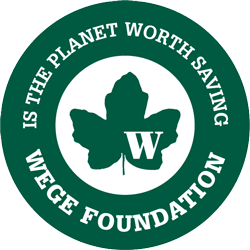

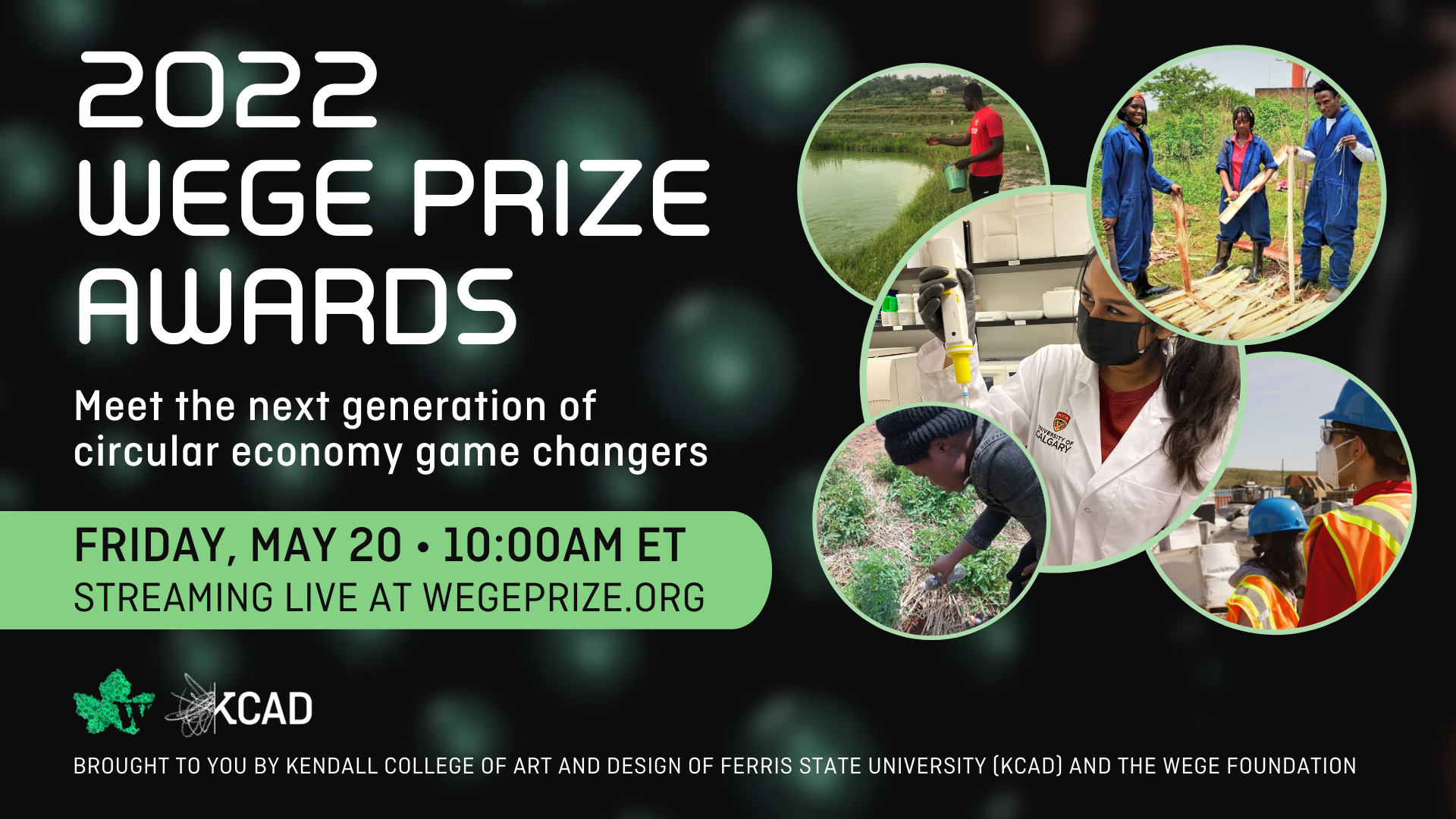
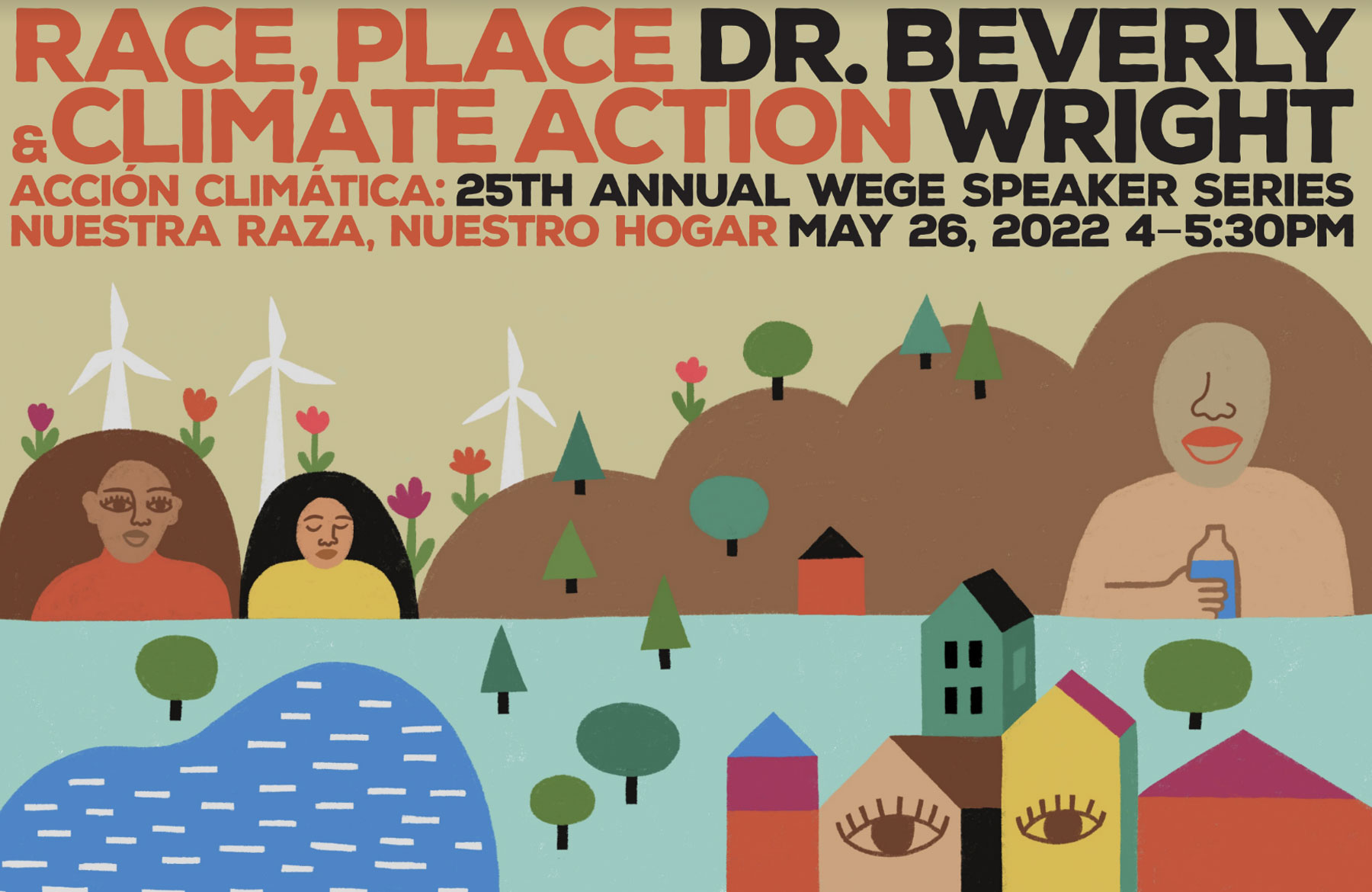
 Presenting is Dr. Beverly Wright, award-winning environmental justice scholar, advocate, author, civic leader and professor. She is the founder and executive director of the Deep South Center for Environmental Justice in New Orleans, a community-university partnership organization that focuses on health inequities and environmental racism along the Louisiana Mississippi River Chemical Corridor and the Gulf Coast Region. The Center provides education, health and safety training, and job placement for residents in climate-impacted communities within the United States. Recently, she was appointed by President Biden as a member of the White House Environmental Justice Advisory Council to help support his whole-of-government approach to the climate crisis.
Presenting is Dr. Beverly Wright, award-winning environmental justice scholar, advocate, author, civic leader and professor. She is the founder and executive director of the Deep South Center for Environmental Justice in New Orleans, a community-university partnership organization that focuses on health inequities and environmental racism along the Louisiana Mississippi River Chemical Corridor and the Gulf Coast Region. The Center provides education, health and safety training, and job placement for residents in climate-impacted communities within the United States. Recently, she was appointed by President Biden as a member of the White House Environmental Justice Advisory Council to help support his whole-of-government approach to the climate crisis.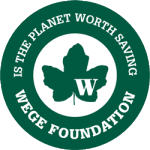
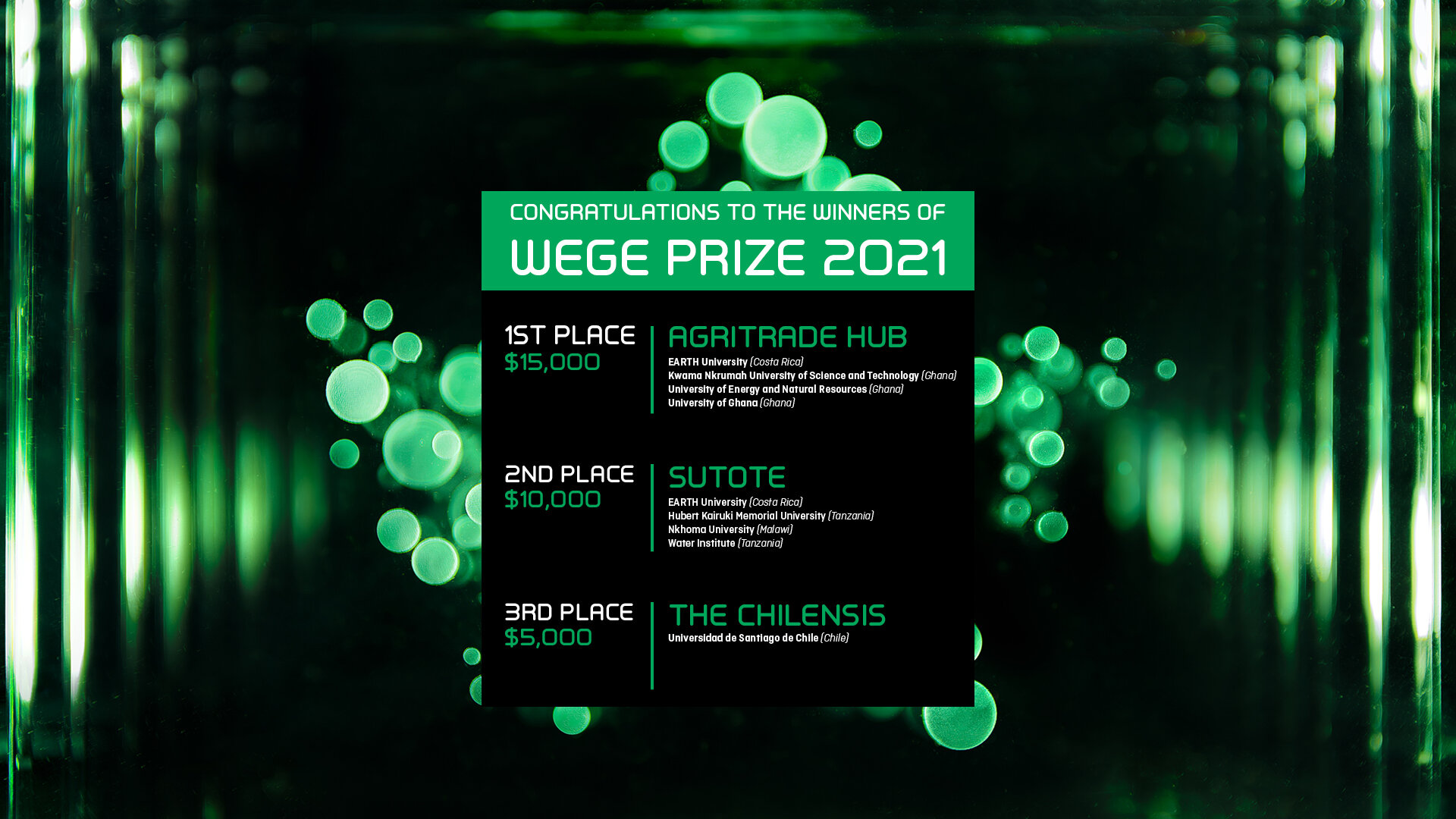
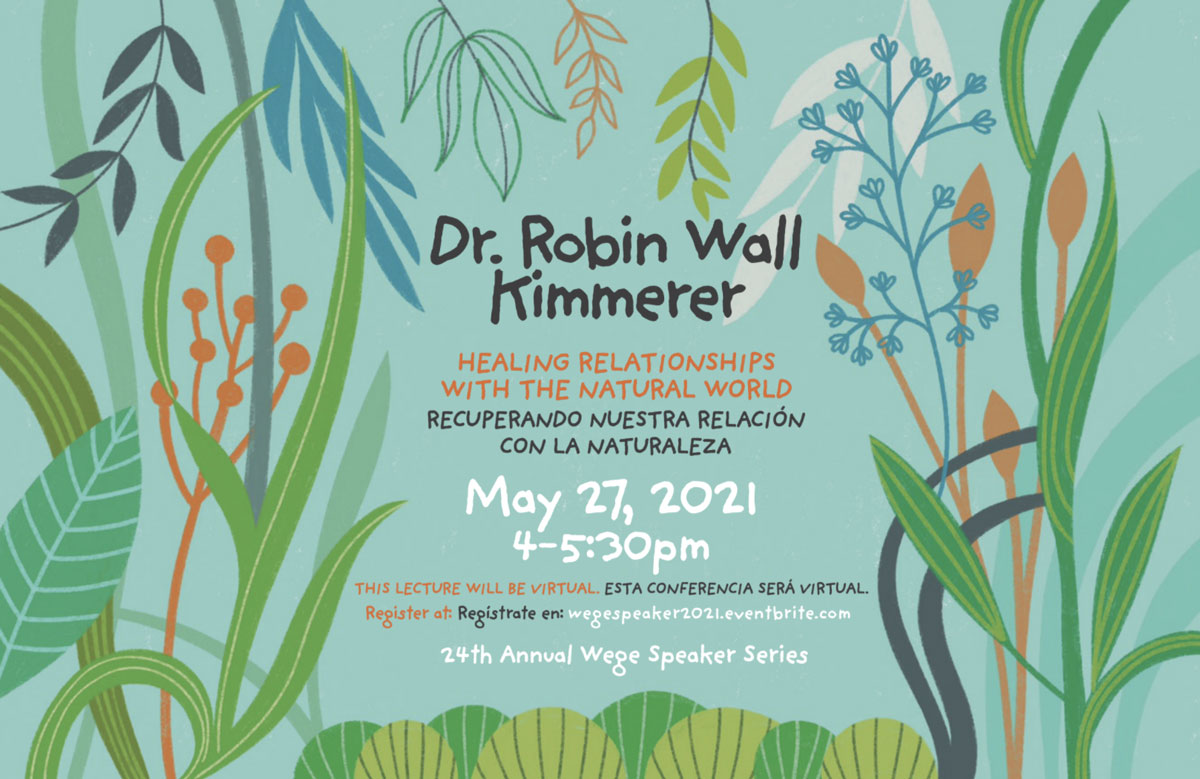
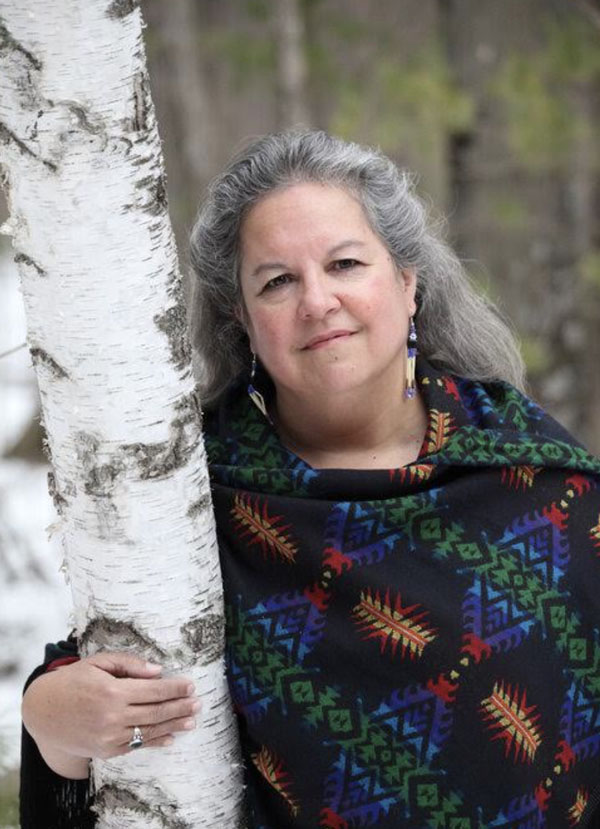 Presenting is Dr. Robin Wall Kimmerer, renowned author, educator and enrolled member of the Citizen Potawatomi Nation. As a scientist, Dr. Kimmerer’s interests include the restoration of ecological communities and the rejuvenation of human relationships to land. She holds a PhD in Botany from the University of Wisconsin. Her presentation is titled Healing relationships with the natural world.
Presenting is Dr. Robin Wall Kimmerer, renowned author, educator and enrolled member of the Citizen Potawatomi Nation. As a scientist, Dr. Kimmerer’s interests include the restoration of ecological communities and the rejuvenation of human relationships to land. She holds a PhD in Botany from the University of Wisconsin. Her presentation is titled Healing relationships with the natural world.